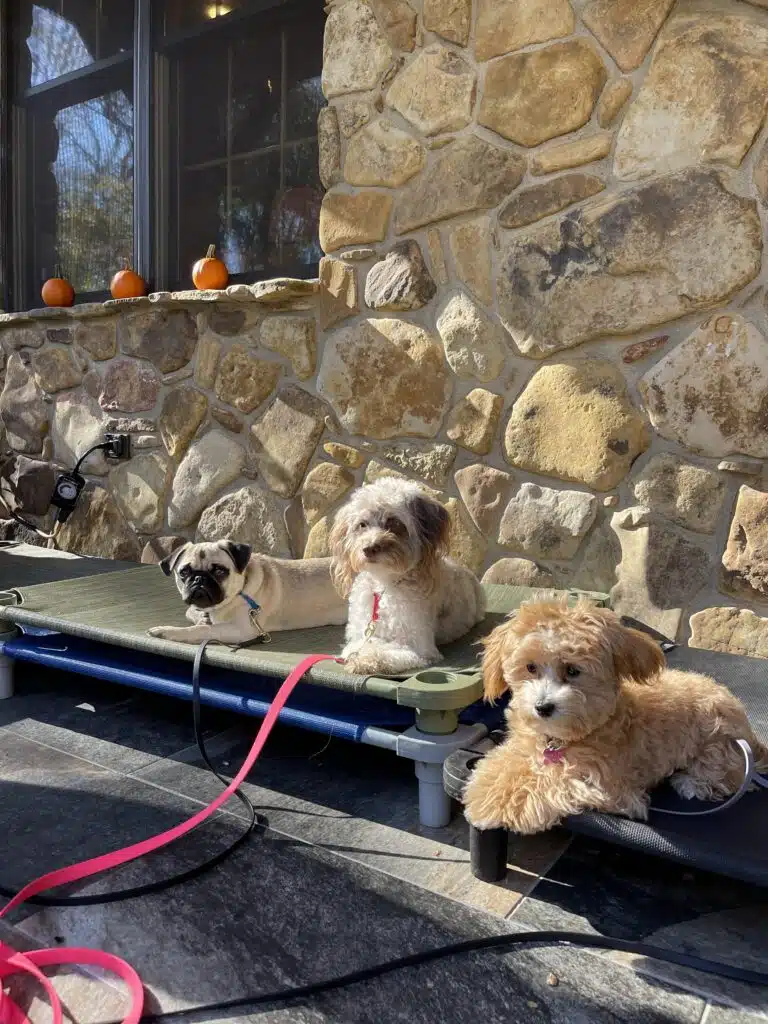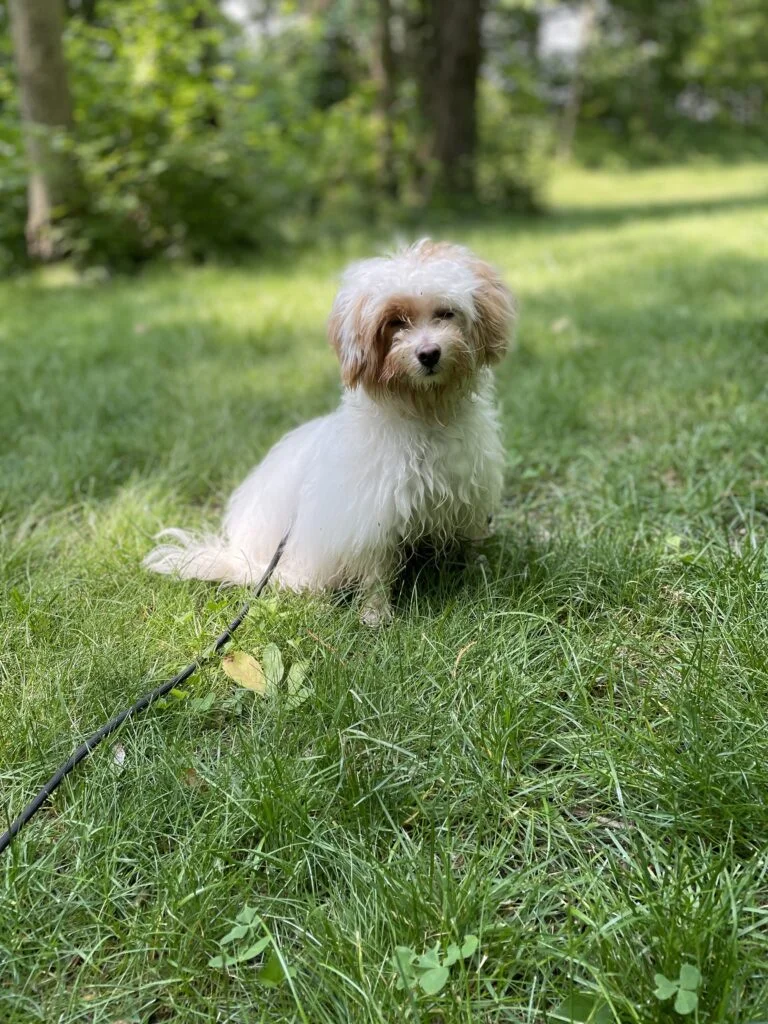Puppy Training Overview
In the journey to a lifelong relationship with your dog, we are focused on developmentally appropriate training. We offer two programs specifically designed to start your puppy out on the right foot. Work with us in a small group setting via our Puppy Foundations classes, or 1:1 with our Puppy Socialization stay and train program.
Puppy Foundations Overview
Our puppy foundation program is a group training program that aims to help your family set your puppy up for lifelong success.
With the help of a dedicated trainer, your and your puppy will learn to safely socialize and manage unwanted puppy behavior. During this four-week program, you’ll meet weekly with your trainer to discuss topics such as crate training, housebreaking, chewing, biting and other puppy behaviors. You’ll also learn how to start treat training with your dog to establish a healthy and happy bond from the start. Puppies are eligible to begin our lesson program after their first round of vaccines (approx 10 weeks).
Having the dog of your dreams often means early intervention and mindful work at the puppy stage. Canine Academy is excited to help you step towards the canine companion of your dreams through early education for this exciting time!
Puppy Socialization Stay and Train Overview
Once your puppy is fully vaccinated (approx 15-16 weeks), you and pup might benefit from a more intensive program, to focus on any lingering puppy issues or to ramp up your socialization efforts.
Puppy socialization means so much more than learning to play with other dogs and people. It also means learning to stay calm even when potential playmates are around, and feeling confident around new sounds, smells and environments.
During a daycare stay or overnight boarding stay, our care and training teams will spend 1:1 time with your puppy, making significant progress in the following areas:
- Potty training
- Crate training
- Leash manners
- Food manners
- Confidence building
- Polite greetings
When you go home on your final day, you’ll spend 1:1 time with your trainer, learning how to apply what your puppy learned at home.
Having the dog of your dreams often means early intervention and mindful work at the puppy stage. Canine Academy is excited to help you step towards the canine companion of your dreams through early education for this exciting time!


Recommended for
Canine Academy’s Puppy Foundations and Puppy Socialization programs are appropriate for dogs between 10 and 24 weeks old. Puppies as young as 10 weeks (having received their first course of vaccines) are welcome to enroll in our Puppy Foundations lesson program. Puppies as young as 15-16 weeks (fully vaccinated) are welcome in our Stay and Train program. Families may participate in one or several of Canine Academy’s puppy offerings. (A pup does not need to be a Foundations grad to enroll in the Stay and Train.)
Vaccination Requirements (Foundations Group Classes):
Dogs must have their first round of vaccines completed a full 7 days before beginning puppy classes.
Required vaccination milestones to participate in class:
By 10 weeks: 1st round DAP, DHPP, DAPP, D2APP (“the Distemper shot”), 1st round Bordetella
By 12 weeks: 2nd round “Distemper,” 1st round Leptospira, 2nd round Bordetella
By 16 weeks: 3rd round “Distemper,” 2nd round Leptospira, Rabies
Vaccination Requirements (Stay and Train):
3rd round “Distemper,” 2nd round Bordetella, 2nd round Leptospira, Rabies
Skills Learned
Our Puppy Management classes each introduce a topic for training and discussion. The classes can be attended in any order. Each class will give an opportunity for your puppy to socialize safely.
- Crate Training & Housebreaking
- Zoomies, Chewing, Biting & Other Puppy Behaviors
- Breaking Bad Habits Before They Start
- Treat Training as Bonding and Dynamic Setting
How it Works
A strong puppy foundation is critical to a long life as your canine companion. Socialization and positive reinforcement are the most important things at this impressionable age. Basic Obedience can wait – housebreaking and socialization cannot!
Phase 1: Puppy Foundations or Puppy Socialization Stay
Before 5 months old, puppies do not have the physical or mental capacity to maximize learning from a basic obedience program. During this time, the most important skills to develop are those that impact mental well-being and safety. Further, this is a critical period to establish good habits and set the stage for a lifetime of good communication between you and your pup.
These options give you opportunities to safely socialize your puppy, and help you master puppy basics such as crate training and housebreaking. Positive experiences during this age will help you avoid issues like separation anxiety and reactivity, as well as strengthen your pup’s sense of security and confidence.
Phase 2: Basic Obedience
Once your puppy is 5 months old, he or she is ready for their obedience training. At this age and with consistent habit-formation, the skills we teach them will last the rest of their lives. Canine Academy has several basic obedience options, from Semi-Private Lessons to Basic Obedience Camp.
Pricing & Enrollment
Tuition for Puppy Foundations program is $250 dollars for the entire series of group classes. Tuition for Puppy Stay and Train programs are $100-$160 daily, with programs starting at 3-days. As an added bonus, a portion of your puppy training tuition can be applied to your dog’s future obedience training.
Puppy Training Frequently Asked Questions
Puppy training typically covers a variety of basic obedience skills and behaviors, including:
House training: teaching your puppy to go potty outside and avoid accidents inside the house.
Basic obedience commands: “sit,” “stay,” and “down.”
Leash training: exposing your puppy to a collar and leash and teaching them to walk on a leash
Socialization: exposing your puppy to new people, places, and experiences to help them develop confidence and become well-adjusted.
Bite inhibition: teaching your puppy to control the force of their bites, which will make them safer to be around, including understanding when you should redirect that behavior.
Problem behavior prevention: addressing common behavioral issues such as chewing, digging, and jumping up on people.
Puppy training is an integral part of puppy development. Introducing puppy training early helps establishes good habits, which strengthens the bond between puppy and owner, and helps ensure a happy, healthy puppy for life. Training paves the way for puppies to learn how to follow instructions, be obedient and respectful when in public situations, and gain the early socialization they need for lifelong success. Importantly, puppy training gives your puppy clear boundaries and expectations, building the foundation from which your puppy will have continuous lifelong learning while developing the skills to understand what behaviors are and are not acceptable.
Crate training can be a valuable tool for raising a well-behaved and happy puppy. It’s a way to provide your furry friend with a safe and comfortable space of their own, while also teaching them important skills like self-control and independence.
One of the primary benefits of crate training is that it can help teach your puppy to be independent. It’s natural for puppies to want to be with their owners at all times, but it’s important for them to learn to be comfortable on their own as well. A crate can provide a sense of security for your puppy, teaching the how to feel at ease when you are not around and helping to reduce the likelihood of separation anxiety developing in the future.
Another benefit of crate training is that it gives your puppy a dedicated area to feel safe, comfortable and relaxed. Puppies require plenty of rest and downtime, and creating a space that provides them with the necessary rest will further help them grow and develop into confident and well-adjusted dogs.
Using treat luring with your puppy can be a great way to teach them new behaviors and build their confidence. Treat luring is a training concept that entails using a small treat as a lure to guide your puppy into a desired position or behavior. For example, you can use a treat to lure your puppy into a “sit” position by holding the treat in front of their nose and slowly moving it up and over their head.
Treat luring is especially useful for puppies who are just starting out with training. It’s a gentle and positive way to introduce them to new behaviors and help them learn what you expect of them. Rewarding them for good puppy behavior can also help to build their confidence and improve the bond between the puppy and the owner.
After you complete your puppy training, your puppy will have a great foundation and will be the right age to start a basic obedience training program to further develop obedience skills and turn them into a good boy or girl.
Obedience training expands the commands that your puppy will learn while also increasing duration, distance, and distraction your dog is exposed to while executing those commands.